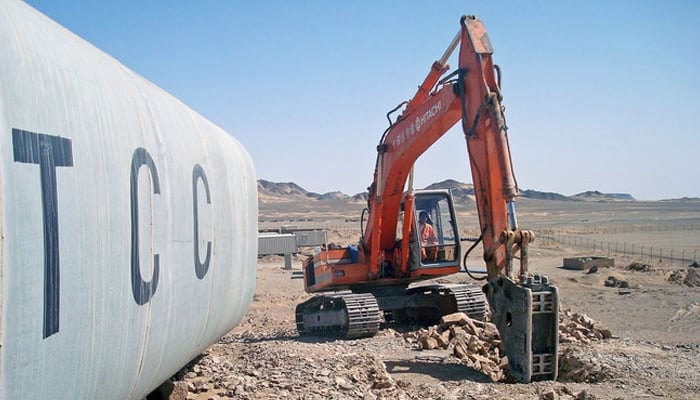Reko Diq, one of the biggest yet-to-be-developed copper mines in the world, is also 50 percent owned by the government of Pakistan  A construction site of Tethyan Copper Company, a joint venture between Barrick Gold of Canada and Antofagasta Minerals of Chile, in Reko Diq, in Balochistan. — Astralconstructors.com/File
A construction site of Tethyan Copper Company, a joint venture between Barrick Gold of Canada and Antofagasta Minerals of Chile, in Reko Diq, in Balochistan. — Astralconstructors.com/File
TORONTO: Canadian miner Barrick Gold is in talks with the International Finance Corporation and other agencies to raise at least $2 billion for the first phase of the Reko Diq copper project in Pakistan, CEO Mark Bristow told Reuters.
Bristow is betting on developing the Reko Diq copper project in Pakistan in which it holds a 50 percent stake, the first phase of which is expected to cost $5.5 billion.
Reko Diq, one of the biggest yet-to-be-developed copper mines in the world, is also 50 percent owned by the government of Pakistan.
Saudi Arabia is in talks to buy part of the stake from the Pakistan government.
Barrick in last August said it is open to bringing in Saudi Arabia's wealth fund as one of its partners in Reko Diq.
Bristow said Barrick won't be diluting its equity in the project but "will not mind" if Saudi Arabia's Public Investment Fund (PIF) wants to buy out the equity of the Pakistan government.
Bristow said Barrick is not interested in bidding for Anglo American, which last week received a $39 billion takeover offer from BHP, and is building its own copper portfolio.
If BHP’s proposed acquisition of Anglo is successful, it would create one of the world’s biggest copper miners.
Analysts and investors expect rival bids to emerge after BHP’s offer was rejected last week by Anglo, which said it was opportunistic, significantly undervaluing the company and its future prospects.
“We are not interested in bidding for Anglo American, as we are building (copper assets) of our own,” Bristow said.
In Mali, where Barrick has a gold mine, the military-led government was last year in talks with miners over a change to its mining law that could see it boost state and private Malian interests in new projects to 35 percent from up to 20 percent previously.
However, Bristow said that the company has received written assurances from the junta that there was no threat of its assets being nationalized.










